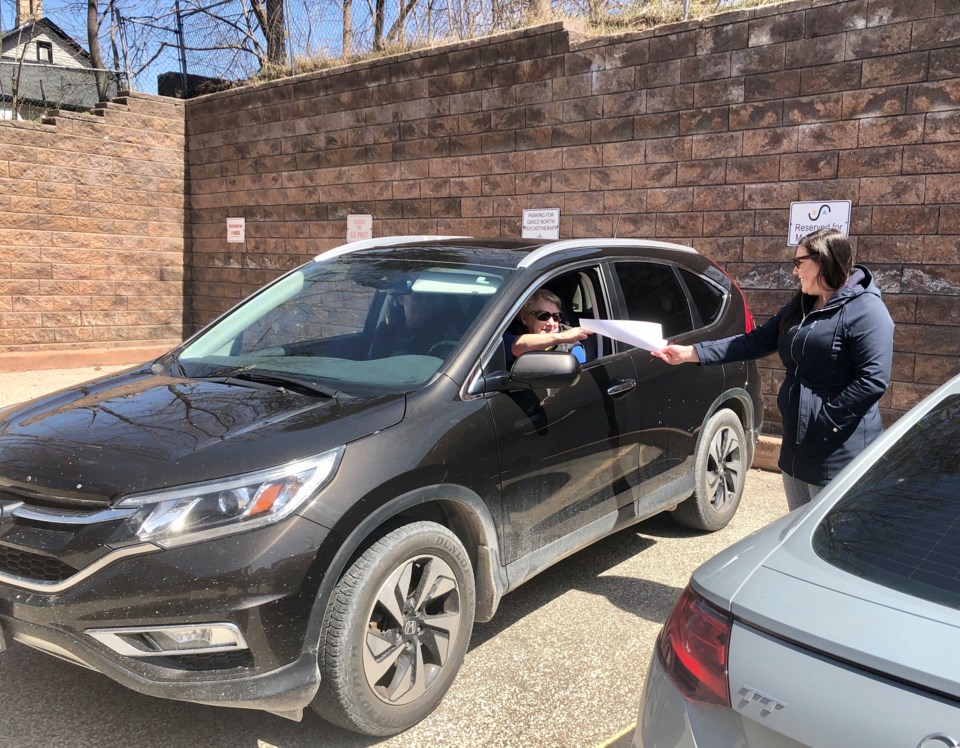A drive-through parking lot signing is not what you would typically expect from your lawyer, but these are odd days.
Instead of having clients inside her office where physical distancing can be difficult, Barrie lawyer Kathryn Whitehead typically hauls her fold-up table out to the parking lot, along with a bottle of sanitizer and the necessary paperwork, and helps her clients put the finishing touches on their real-estate deals, mortgages and wills.
“Those back parking lot signings come in handy when you have clients who don’t have the capabilities of doing any kind of video,” said Whitehead, who is also president of the Simcoe County Law Association.
“They come and they stay in their vehicles, pass the papers through the window," she told BarrieToday. "They have their own pen, sanitizer, a board or some hard book to sign on.”
Whitehead said there were already contracts in the works that she’s seeing to completion, but now she’s also dealing with residential real-estate refinancing and she’s experiencing a bit of a rush people wanting to develop a clear estate plan and create or update wills.
Electronic signatures are not permitted in real-estate transactions where “wet signing” or putting pen to paper is still required.
But no one wants wet paper. So Whitehead carefully synchronizes the signings with the weather.
Barrie lawyer Cesia Green has also experienced an increase in those wanting to create and update wills and was using the parking-lot routine as well. But she found it such a cumbersome task because she had to be strategic about lining up the client who wanted to sign off on their will because the process requires that the two witnesses be on hand at the same time.
And the witnesses can’t just be anyone. Witnesses for the powers of attorney can’t be the person who is seeking the power of attorney. Anyone named in a will, and their spouse, can’t act as a witness for that will.
“It may be very difficult for anyone you may be sheltering in place with to be a witness on any of those documents,” said Green, who also does real-estate law at her south-end Barrie practice.
So that meant getting everyone to congregate at the same time in their cars in the parking lot, passing the papers from car window to car window, run back in to copy it all on a day when the elements wouldn’t threaten to wipe out all the work.
COVID-19 seemed to increase the urgency for those seeking wills and Green, who has seen the horror stories at the other end when people never got around to drafting a will, thought it important to accommodate that demand.
But the parking-lot solution, at least for wills, just didn’t seem tenable. Even though they weren’t all together in one closed room, it seemed there could be better ways to more closely follow physical-distancing practices.
When Green expressed her concerns to her dad, also a lawyer, he called up a local MPP, who just happens to be Attorney General Doug Downey, who, in turn, called the younger Green.
“We had a good chat about what the issues are; there are obviously some limitations of what could be done,” she said.
Downey said he also had a conference call with senior lawyers from across Ontario to work out a proposal on how to do the signings virtually through video conferences.
“At the end of that, we put forward our emergency order and put it in place. So you can now actually get your will in a virtual setting; there’s guidelines around that,” said Downey. “It really addresses an issue that has been out there.
"We’ve done wills the same way for 600 years and here’s an opportunity to accomplish safety and security and let people get the important documents done," he added.
Downey called it "an interim measure."
"We can certainly see how the experience went and have a conversation," he said. "That’s a really a good example of how this may change the system in the long term.”
Now the person getting the will gathers via video with the lawyer and witnesses as one signs the document. When the first witness gets the will to the second witness they get back onto a video chat.
Green says it’s a bit clunky, but will do for now. But when the crisis is over, she plans to get the clients and witnesses back into her office to do it the old way.
She’s concerned that other jurisdictions, where her clients might have property or other assets, may not accept the video signing process.
“It’s really important that there be the checks and balances to make sure people are signing a will that they want to sign. There is absolutely a risk of people being unduly influenced or there being fraud when you bend the rules a little too much,” she said.
Overall, Green and Whitehead see a lot of headway being made as the health crisis forces us to do things differently. Various groups have popped up to share best practices and ideas of how the work may get done and there has been a lot of collaboration within the profession.
“People have commented that we don’t know why we didn’t do this before,” said Green. “But at least we’re doing it now and learning from each other in terms of how to best work with our clients and get the work done.”
Now with video conferencing, phone conferencing, e-filing, e-mail submissions and other approaches recently adopted to maintain physical distancing, the justice system has proven it can be more modern, said Whitehead.



